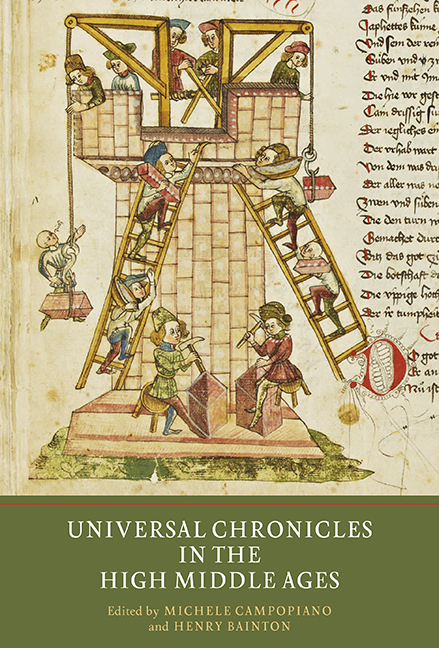Book contents
- Frontmatter
- Contents
- List of Illustrations
- Dedication
- Contributors
- Introduction: New Perspectives on Universal Chronicles in the High Middle Ages
- 1 The First Islamic Chronicle: The Chronicle Of Khalīfa B. Khayyāṭ (d. AD 854)
- 2 Universal Historiography as Process? Shaping Monastic Memories in the Eleventh-Century Chronicle Of Saint-Vaast
- 3 Writing Universal History in Eleventh-Century England: Cotton Tiberius B. i, German Imperial History-writing and Vernacular Lay Literacy
- 4 Political Didacticism in the Twelfth Century: the Middle-High German Kaiserchronik
- 5 Cosmology, Theology of History and Ideology in Godfrey of Viterbo's Pantheon
- 6 Écrire l'histoire universelle à la cour de Konrad IV de Hohenstaufen : la Weltchronik de Rudolf von Ems (milieu du XIIIe siècle)
- 7 Écrire la première histoire universelle en français: l'Histoire ancienne jusqu’à César de Wauchier de Denain et l'adaptation du modèle latin de l'histoire universelle à un public de laïcs
- 8 How Unusual was Matthew Paris? The Writing of Universal History in Angevin England
- 9 The Pillars of Hercules: The Estoria De Espanna (Escorial, Y.I.2) as Universal Chronicle
- 10 La vie d'Alexandre dans la Chronique dite de Baudouin d'Avesnes
- 11 Universal Histories and their Geographies: Navigating the Maps and Texts of Higden's Polychronicon
- Index
- Writing History in the Middle Ages
1 - The First Islamic Chronicle: The Chronicle Of Khalīfa B. Khayyāṭ (d. AD 854)
Published online by Cambridge University Press: 23 June 2018
- Frontmatter
- Contents
- List of Illustrations
- Dedication
- Contributors
- Introduction: New Perspectives on Universal Chronicles in the High Middle Ages
- 1 The First Islamic Chronicle: The Chronicle Of Khalīfa B. Khayyāṭ (d. AD 854)
- 2 Universal Historiography as Process? Shaping Monastic Memories in the Eleventh-Century Chronicle Of Saint-Vaast
- 3 Writing Universal History in Eleventh-Century England: Cotton Tiberius B. i, German Imperial History-writing and Vernacular Lay Literacy
- 4 Political Didacticism in the Twelfth Century: the Middle-High German Kaiserchronik
- 5 Cosmology, Theology of History and Ideology in Godfrey of Viterbo's Pantheon
- 6 Écrire l'histoire universelle à la cour de Konrad IV de Hohenstaufen : la Weltchronik de Rudolf von Ems (milieu du XIIIe siècle)
- 7 Écrire la première histoire universelle en français: l'Histoire ancienne jusqu’à César de Wauchier de Denain et l'adaptation du modèle latin de l'histoire universelle à un public de laïcs
- 8 How Unusual was Matthew Paris? The Writing of Universal History in Angevin England
- 9 The Pillars of Hercules: The Estoria De Espanna (Escorial, Y.I.2) as Universal Chronicle
- 10 La vie d'Alexandre dans la Chronique dite de Baudouin d'Avesnes
- 11 Universal Histories and their Geographies: Navigating the Maps and Texts of Higden's Polychronicon
- Index
- Writing History in the Middle Ages
Summary
The Chronicle (Ar. Taʾrīkh) of Khalīfa b. Khayyāṭ (d. AD 854) was composed in the early-to-mid ninth century and is the oldest Islamic chronicle still extant. Its compiler was a scholar of Qurʾān and ḥadīth – that is, a scholar of both of the Qurʾānic revelation and of the ‘reports’ or ‘traditions’ about the Prophet Muḥammad and the earliest Muslims. Khalīfa lived and worked in the large southern Iraqi port city of Basra – at the time one of the foremost centres of learning in the Islamic world. His Chronicle is arranged annalistically by years of the lunar Hijri calendar, beginning, after a short introduction, with year one – the year of the Prophet Muhammad's emigration (hijra) from Mecca to Medina (AD 622) – and ending with year AH 232/AD 847. It covers, in summary fashion, the political and administrative history of the Muslim polity, from its origins in Medina at the time of the Prophet and under the first caliphs through to the Umayyad and Abbasid caliphates.
Despite its early date, Khalīfa's Chronicle has received little attention in modern scholarship. Survey and textbook accounts tend to remark on its being the earliest surviving history in Arabic arranged chronologically, in contrast to earlier extant works which are structured thematically or arranged as biographical entries on individuals by generations. Modern historians have tended to dismiss it as telling us little or nothing that is not found in later, more famous works of the ninth century. It is, after all, much shorter than the surviving compendious histories produced in Iraq two or three generations later by al-Balādhurī (d. c. 892) and al-Ṭabarī (d. 923): al-Ṭabarī's History of Messengers and Kings (Taʾrīkh al-rusul wa-l-mulūk) is perhaps twenty times as long; al-Balādhurī's genealogically-arranged historical work, Genealogies of the Tribal Notables (Ansāb al-ashrāf), is perhaps about fifty times the length of Khalīfa's work.
But although Khalīfa's Chronicle may not provide many facts not known from later works, his framing of the material and the context of its compilation are markedly different from other early histories. In other words, the Chronicle itself is a hitherto-overlooked historical fact that raises important questions about the origins and development of Arabic chronicle-writing and the different ways in which the early Muslims went about finding their place in history and politics.
- Type
- Chapter
- Information
- Universal Chronicles in the High Middle Ages , pp. 19 - 42Publisher: Boydell & BrewerPrint publication year: 2017



